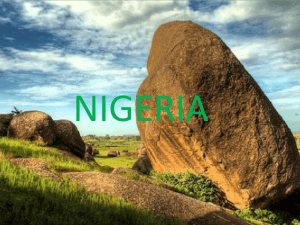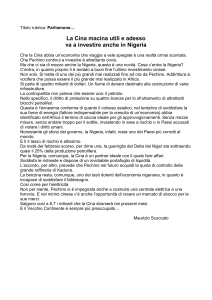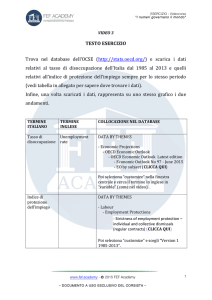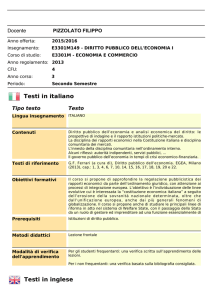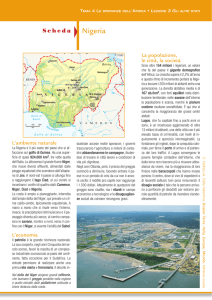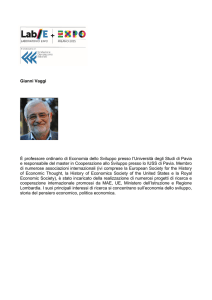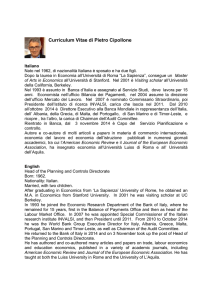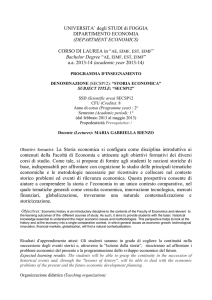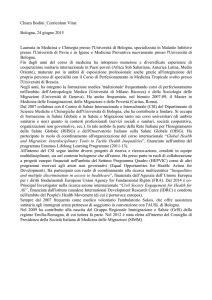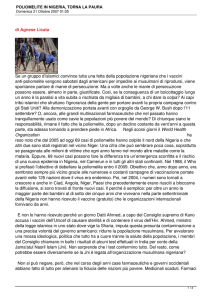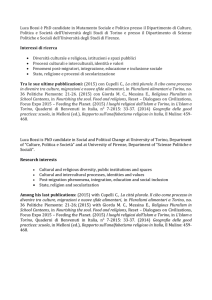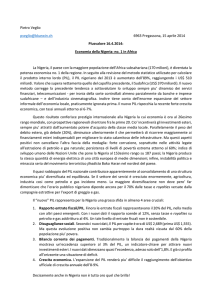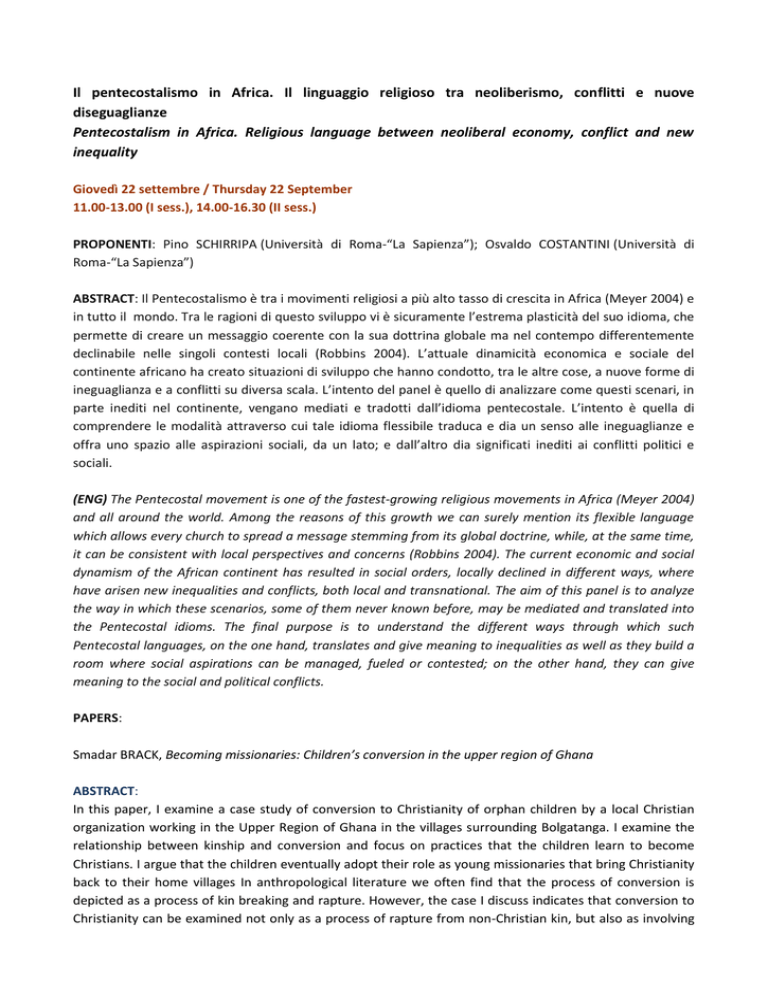
Il pentecostalismo in Africa. Il linguaggio religioso tra neoliberismo, conflitti e nuove
diseguaglianze
Pentecostalism in Africa. Religious language between neoliberal economy, conflict and new
inequality
Giovedì 22 settembre / Thursday 22 September
11.00-13.00 (I sess.), 14.00-16.30 (II sess.)
PROPONENTI: Pino SCHIRRIPA (Università di Roma-“La Sapienza”); Osvaldo COSTANTINI (Università di
Roma-“La Sapienza”)
ABSTRACT: Il Pentecostalismo è tra i movimenti religiosi a più alto tasso di crescita in Africa (Meyer 2004) e
in tutto il mondo. Tra le ragioni di questo sviluppo vi è sicuramente l’estrema plasticità del suo idioma, che
permette di creare un messaggio coerente con la sua dottrina globale ma nel contempo differentemente
declinabile nelle singoli contesti locali (Robbins 2004). L’attuale dinamicità economica e sociale del
continente africano ha creato situazioni di sviluppo che hanno condotto, tra le altre cose, a nuove forme di
ineguaglianza e a conflitti su diversa scala. L’intento del panel è quello di analizzare come questi scenari, in
parte inediti nel continente, vengano mediati e tradotti dall’idioma pentecostale. L’intento è quella di
comprendere le modalità attraverso cui tale idioma flessibile traduca e dia un senso alle ineguaglianze e
offra uno spazio alle aspirazioni sociali, da un lato; e dall’altro dia significati inediti ai conflitti politici e
sociali.
(ENG) The Pentecostal movement is one of the fastest-growing religious movements in Africa (Meyer 2004)
and all around the world. Among the reasons of this growth we can surely mention its flexible language
which allows every church to spread a message stemming from its global doctrine, while, at the same time,
it can be consistent with local perspectives and concerns (Robbins 2004). The current economic and social
dynamism of the African continent has resulted in social orders, locally declined in different ways, where
have arisen new inequalities and conflicts, both local and transnational. The aim of this panel is to analyze
the way in which these scenarios, some of them never known before, may be mediated and translated into
the Pentecostal idioms. The final purpose is to understand the different ways through which such
Pentecostal languages, on the one hand, translates and give meaning to inequalities as well as they build a
room where social aspirations can be managed, fueled or contested; on the other hand, they can give
meaning to the social and political conflicts.
PAPERS:
Smadar BRACK, Becoming missionaries: Children’s conversion in the upper region of Ghana
ABSTRACT:
In this paper, I examine a case study of conversion to Christianity of orphan children by a local Christian
organization working in the Upper Region of Ghana in the villages surrounding Bolgatanga. I examine the
relationship between kinship and conversion and focus on practices that the children learn to become
Christians. I argue that the children eventually adopt their role as young missionaries that bring Christianity
back to their home villages In anthropological literature we often find that the process of conversion is
depicted as a process of kin breaking and rapture. However, the case I discuss indicates that conversion to
Christianity can be examined not only as a process of rapture from non-Christian kin, but also as involving
the making of new and maintaining of old kin ties. This is perhaps true to a greater extent in the case of
children, whose care is often dependent on others. Among the children kinship relationships are prevalent
in three levels: first, in the making of new kin with the Christian fostering family; second, in maintaining
relationships with the natal family members who still reside in the rural villages and have not necessarily
converted to Christianity; and lastly, in the creation of kinship relationships with the spiritual family of
Jesus. In this scheme, the children become mediators between the foster Christian organization, their new
family members and religion, AND the village, their natal families and the ancestral or Muslim beliefs from
which they come. By so doing, I argue, the children themselves turn from converts to converters. When
they return to their villages and their extended families, the children are now the carriers of Christianity
drawing their kin into the “family of Jesus.” Becoming Christians enables the children certain opportunities
of mobility and a way out of Bolgatanga and sometimes out of Africa, which sets the foundations to what I
later discuss as part of the idea of a Christian citizenship.
PROPOSER’S ACADEMIC PROFILE:
PhD candidate. Department of Anthropology, University of Michigan.
Studying African Pentecostalism in Ghana and in Italy.
Research topics: Ghana; African diaspora in Europe; Global Christianity; kinship and citizenship.
Davide CASCIANO, Ineguaglianze, lotte armate e neo-pentecostalismo nella città petrolifera di Port
Harcourt, Nigeria
ABSTRACT:
Questo contributo vuole analizzare lo spazio del neo-pentecostalismo nel rielaborare il dissenso e
l’esperienza delle diseguaglianze nella città petrolifera di Port Harcourt, in Nigeria. Dopo una devastante
guerra civile, l'espansione del mercato petrolifero negli anni '70 fu in Nigeria una "benedizione" che fece
"rinascere" la nazione in un nuovo benessere ed in uno spettacolo della "prosperità". Tuttavia le crescenti
diseguaglianze e le infrastrutture carenti crearono lo spazio di una lotta, spesso armata, contro
multinazionali e Stato. Le chiese neo-pentecostali, come mostrerò, pur criticando in parte alcuni iniziative
statali si posero generalmente al suo fianco. Infatti, offrirono una soluzione popolare ad un benessere non
più percepito come consequenziale ai frutti del proprio lavoro, una "economia dei miracoli" e provarono a
calmierare la lotta armata plasmando, tramite dispositivi narrativi e rituali, soggettività adattabili a
condizioni lavorative instabili.
(ENG) The purpose of this contribution is to analyse how neo-Pentecostalism frames experience of
discontents and inequalities in the oil-rich city of Port Harcourt, Nigeria. After a devasting Civil war, petrol
market expansion in the 1970s was, in Nigeria, a "blessing" which "reborn" the Nation in wealthness and in
a spectacle of "prosperity". However, rising inequalities and poor infrastructures make space for struggles,
often armed, against corporations and State. Neo-Pentecostal churches, as I will show, while criticising
certain aspects of State initiatives, are not, generally, their opponents. Indeed, neo-Pentecostalism offered
popular solutions for a wealthness not more connected with the value of hard work, a "miracle economy"
and tried to keep down armed struggles by shaping individual subjects, reliable to unstable working
conditions, through
narrative and ritual devices.
Profilo del proponente: Davide Casciano (28/01/1986, Frascati, Roma) è dottorando XXX° Ciclo in Storia,
Antropologia e Religioni presso l’Università “Sapienza” di Roma. La sua ricerca verte sugli idiomi religiosi
neo-pentecostali nel contesto della crisi socio-politica dell’area petrolifera di Port Harcourt, Niger Delta,
Nigeria.
Osvaldo COSTANTINI, “Adesso siamo tutti figli di Dio”. Pentecostalismo eritreo ed etiopico a Roma e
tentativi di riassorbimento del passato conflittuale
ABSTRACT: Questo lavoro si propone di analizzare alcune particolarità del pentecostalismo eritreo ed
etiopico a Roma, evidenziando le modalità con le quali il linguaggio spirituale si dimostra capace di
assorbire il conflitto tra i due gruppi nazionali. Tra le due popolazione intercorre un rapporto conflittuale
maturato nel corso dei trent’anni della guerra di liberazione dell’Eritrea dall’Etiopia (1961-1991) e nel corso
dell’ultimo sanguinoso conflitto per una questione di confini nel 1998-2000. Nel contesto romano i due
gruppi vivono situazioni sociali affini, ma la separazione resta una carattere predominante. Nelle chiese
pentecostali invece vi è un tentativo di operarne un superamento attraverso l’idioma religioso: molte
predicazioni vengono fatte in comune, le principali festività religiose vedono l’unione delle congregazioni, e
il passato di separazione delle chiese pentecostali in eritree ed etiopiche a Roma viene depurato, nelle
narrazioni, dai suoi contenuti nazionalisti. Lo scopo del lavoro è mostrare le modalità con le quali il
linguaggio religioso costruisce la cornice ideologica in grado di accogliere il discorso di riassorbimento del
conflitto. In secondo luogo si vuole riflettere sulle forme di appartenenza transnazionale a cui consentono
di accedere movimento come il pentecostalismo che fa del globale l’orizzonte verso cui orientare il proprio
sguardo.
PROFILO ACCADEMICO DEL PROPONENTE:
Osvaldo Costantini ha ottenuto il dottorato in antropologia culturale presso la Sapienza-Università di Roma.
È membro della Missione Etnologica Italiana in Tigray-Etiopia, e ha lavorato per alcuni periodi nell’ambito
dell’accoglienza ai migranti mescolando lavoro e ricerca scientifica.
Silvia CRISTOFORI, Usi e interpretazioni della Bibbia nel pentecostalismo nigeriano
ABSTRACT:
Il paper intende esporre i primi esiti di una più ampia ricerca che analizza gli usi e le interpretazioni della
Bibbia nelle chiese pentecostali africane. In particolare l'esposizione sarà incentrata sull'analisi di una
selezione di testi devozionali prodotti da alcuni Pastori nigeriani. In tal senso il paper evidenzierà i
riferimenti biblici contenuti nei testi in questione con l'obiettivo di illustrare gli ancoramenti scritturali del
vangelo della prosperità. Si proverà così a verificare se, e in che modo, tali ancoramenti diano lettura della
temperie neoliberista che la Nigeria attraversa dalla fine degli anni Ottanta.
Tale analisi sarà contestualizzata all'interno della lunga e diversificata storia del cristianesimo in Nigeria, al
fine di cogliere linee di continuità e discontinuità fra la lettura pentecostale odierna e altre forme di
appropriazione della Bibbia. Il paper delineerà, inoltre, brevemente le principali similitudine e differenze
che la letteratura antropologica individua fra pentecostalismo e alcune tendenze attuali dell'islam in Africa
occidentale. Similitudini e differenze che il paper declinerà in riferimento alle tema dell'uso della Scrittura.
PROFILO ACCADEMICO DEL PROPONENTE: Silvia Cristofori è ricercatrice (t.d.) di antropologia culturale
presso l'università degli studi Link Campus University (Roma) dove insegna antropologia culturale e storia
delle religioni. Il suo principale tema di ricerca sono i movimenti religiosi in Africa sub-sahariana.
Cecilia DRAICCHIO, Prayer camp e malattia mentale nel Ghana rurale
ABSTRACT: Il paper intende riflettere sul ruolo che le chiese pentecostali e carismatiche, e in particolare i
prayer camp ad esse connessi, ricoprono nel campo della salute mentale nel contesto ghanese, sul modo in
cui al loro interno sono (ri)semantizzate la malattia mentale, la speranza di guarigione e le relazioni con
altre risorse terapeutiche come quelle istituzionali. Fortemente stigmatizzati dalla maggior parte dei media
nazionali e dalle istituzioni governative - soprattutto in occasione del dibattito che ha accompagnato la
recente riforma psichiatrica (Mental Health Act 846) - e delegittimati dai cosiddetti “guaritori tradizionali”, i
prayer camp sono dei luoghi di culto annessi a chiese cristiane (solitamente definite “pentecostali”,
“spirituali” o “carismatiche”) in cui persone che hanno bisogno di aiuto in diversi ambiti (sanitario,
sentimentale, economico/lavorativo) si rivolgono all’ɔsɔfo, il pastore che vi risiede, affinché risolva i loro
problemi per intercessione di Dio. Nel Ghana rurale - e in particolare nell’area nzema dove ho svolto la mia
ricerca - essi rappresentano la risorsa terapeutica cui si ricorre più spesso (anche in combinazione con altre)
nel caso di “patologie mentali”; il loro successo - che sembra essere in costante crescita - è fortemente
radicato nel contesto locale e, allo stesso tempo, pienamente inserito in una rete di relazioni transnazionali
(Van Dijk 1997).
Generalmente nei prayer camp la malattia mentale è concettualizzata come una possessione demoniaca
(non necessariamente connessa ad un peccato commesso dal “paziente”) e la terapia consiste in una
residenza nel campo (senza limiti di tempo) durante la quale si praticano la preghiera e il digiuno. Gli ɔsɔfo
si propongono come profondamente altri sia rispetto alla “medicina tradizionale” che alla biomedicina, ma
intrattengono, soprattutto con i rappresentanti di quest’ultima, delle relazioni ambigue, che situano gli
ospiti dei campi in uno spazio in cui il “confine tra cura e mercato” (Biehl 2012) è tutt’altro che definito. Lo
stato di marginalità in cui spesso versano le persone affette da malattia mentale – connesso in modo
diretto alle disuguaglianze prodotte dall’ordine sociale neoliberista e dall’inadeguatezza del sistema
sanitario ghanese - trova nei prayer camp allo stesso tempo un’ipotesi di soluzione e una delle sue più
emblematiche rappresentazioni.
PROFILO ACCADEMICO DEL PROPONENTE: Cecilia Draicchio si è laureata in Discipline EtnoAntropologiche presso l’Università di Roma-La Sapienza nel gennaio 2016 con una tesi intitolata “Politiche
della salute mentale in Ghana. Etnografia della malattia mentale in area nzema tra biomedicina, stregoneria
e religione”.
Pino SCHIRRIPA, Pentecostal pedagogies. Subjectivation tecnicques, developmental rhetoric and
neoliberalism in Ethiopian Pentecostal churches
ABSTRACT:
Since 2011 the A. is carrying on a fieldwork research on Pentecostal movements in Tigray, where it is
dramatically widespread in the last few year, following the trend of the all country (Haustein, Fantini ed.
2014)
The paper focuses on some development programs which, at different levels, involving some Pentecostal
churches. These are programs that have as their target the children and their education. They sometimes
focus on education through the supply of school materials. All of them, however, provide extracurricular
activities where are carried out recreational and educational activities, as well as bible studies. These
programmes are often sponsored by big transnational agencies that work with Ethiopian churches, such as
the Mulu Wengel Church. Other times they start out as smaller-scale initiatives of churches abroad who
have a mission in Ethiopia.
The paper has two aims. First intends to describe the transnational networks and their effect on the local
level. Using the tools of anthropology of policies (Shore, Sharma, Guptha) wants to explore through
ethnography the networks and their local counterpart as institutions. The aim is to analize those institution
in their daily relationships with the involved social actors. Second, it focuses on the content of educational
work, showing how one can speak of a Pentecostal pedagogy. In this way the A. wants to answer a
fundamental question, What is the relationship between the construction of Pentecostal individuals,
through precise pedagogical strategies, and the rhetoric of development based on empowerment?
PROFILO ACCADEMICO DEL PROPONENTE:
Pino Schirippa è Professore associato Discipline Demoetnoantropologiche, Sapienza Università di Roma
Donatus Pius UKPONG, Pentecostalism and economic development: Using flattery for negotiating economic
inequalities in Nigeria
ABSTRACT:
The Spirit is poured out for the transformation and renewal of the earth leading to the fulfilment of the
mission of Jesus: that they may have life abundantly. The new life makes possible by the Spirit is revealed in
popular Pentecostal language through health and wealth accessible to the believers. This has led to the trek
from rural to urban areas; from urban centre to megacity in Nigeria. Pentecostalism is inherently rooted in
the desire for betterment either in this-world or in the other-world, or perhaps in both. Pentecostal
impetus is, therefore, connected to economic development and mobility. Pentecostal language appeals to
those who are disadvantaged economically, and to those who are struggling against economic inequalities.
Few peculiar religious practices like tithing, seed-sowing are proposed as means of economic
empowerment by the Pentecostals. Many Nigerians are embracing this tradition, seeing in its religious
rituals and practices avenues for economic transformation. Unfortunately, very often it is the pastors or
Pentecostal leaders who seem to be immediate beneficiaries of this gospel significantly, while those who
are tithing and sowing seeds remain within the poverty bracket. This raises problems of the persistent of
economic inequalities in the Pentecostal cycles. Adopting theological method of enquiry in sociological
context, this paper discovers that Pentecostal leaders in Nigeria use the language of flattery to sustain
economic inequalities, offering people illusive hope thereby minimizing conflict, and above all,
reinterpreting individual’s economic immobility as an index of personal vulnerability for which the person is
responsible before God. Thus Pentecostal rhetoric creates and sustains economic inequalities in developing
economies like Nigeria. This paper affirms that economy is not exempted from the influence of the creative
Spirit of God, and as such genuine domain of religious and theological synthesis. But using flattery to
negotiate economic inequalities in religious context is wary and exploitative. Mere appeal to
supernaturalism for economic breakthrough generates anxieties and restiveness in the society.
PROPOSER’S ACADEMIC PROFILE:
Donatus Pius Ukpong is PhD at Department of Religious and Cultural Studies, University of Uyo, Uyo,
Nigeria
Dieudonné ZOGNONG, Afro-Pentecostalism and human rights in sub-Saharan Africa
Abstract:
But is Pentecostalism still what it was? Within the current sub-Saharan context, it is affected by a
profiteering spirit, and then strongly associated with abuses to human rights (civil, political, social, and
economic rights), as religious entrepreneurship now ranks high among strategies for personal survival in
the face of rising pauperization, as indicated by the proliferation of ‘deliverance centres’ which are
multiplying faster than the number of schools and health centres, and by the growing number of streetsmart and creative fellows trying to take advantage of the restoration of freedoms of association by the
socio-political liberalization of the 1990s, to try their luck in preaching, while self-proclaiming as God’s
elects and prophets, combining the Pentecostal rhetoric of ‘Prosperity Gospel’ with Shamanic practices to
sell ‘miracles’ to desperate and gullible believers, among whom they are riding in influence. And since this
religious business tends to target poorer classes and is regularly accompanied by abuses of human dignity
and even criminal leanings, the question arises: is the Afro-Pentecostal entrepreneurship not incarnating a
new regime of human rights abuses? How much of its emergence and the current ‘religious’ effervescence
is the result of corrupt political and economic governance, especially with regard to the governance of
religious freedoms? Our analysis is trying to provide some answers.
PROPOSER’S ACADEMIC PROFILE:
Dieudonné Zognong, PhD
Visiting Researcher at the Department of Philosophy University of Tromsø, Norway, in 2015-2016.

